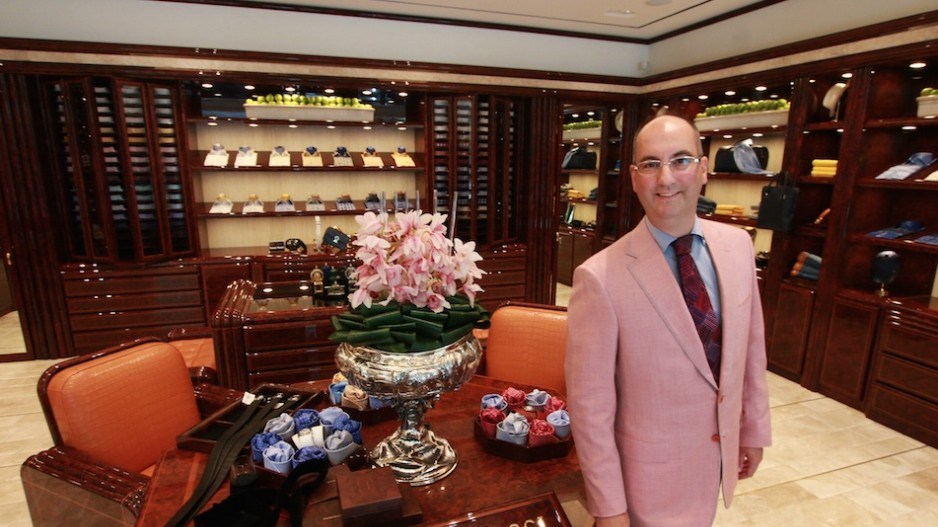With B.C.’s economy partly supported by the proceeds of crime, the whole province could suffer financially if the B.C. government is successful at cutting the flow of dirty money into legitimate assets.
And luxury retailers’ bottom lines could be particularly hard hit by a serious crackdown on money laundering in the province.
A recent independent report from former RCMP officer Peter German spelled out how luxury retailers in the province are increasingly profiting from customers buying goods with dirty money. The B.C. government responded with a vow to curb the flow of ill-gotten gains into assets that appear to be legitimate.
Exactly what measures it will take against money laundering are yet to be seen, but Attorney General David Eby said one loophole that must close is the ability of luxury retailers to accept more than $10,000 in cash without filling out forms to indicate the source of the money, or to note that the transaction is suspicious.
Manuel Bernaschek, president of high-end retailer Stefano Ricci Vancouver and owner of Showcase Pianos, told Business in Vancouver that his staff do not accept cash transactions of more than $10,000 unless a customer is fully open about his or her identity and where the money came from.
“My policy is that if we do take over $10,000, we tell the customer that we will give their phone number to the bank and the bank would follow up with them,” Bernaschek said. “Basically, that stops it right there.”
Occasionally, a customer will spend up to $8,000 in cash at his high-end menswear boutique, and staff accept that cash, he said.
However, “every couple months in the piano store we’ll get someone saying, ‘Oh, can I pay this $60,000 or $100,000 in cash?’ and we won’t touch that,” Bernaschek said.
German, however, identified one transaction in which a car dealership accepted $240,000 in cash from a customer who bought a luxury vehicle. Dealership officials took the cash to a bank and needed only to fill out a large-cash-transaction report – not a suspicious-transactions form, which would have gone to the Financial Transactions and Reports Analysis Centre of Canada.
If Eby is successful at curbing large cash transactions, the result would have repercussions across the economy, said Fraser Institute senior policy analyst Josef Filipowicz.
While he stressed that he does not know how big a slice of total revenue these transactions comprise for luxury retailers, he said that less demand for high-end retail products would hit those retailers’ bottom lines, and may force some to close.
Those closures would mean that former retail sales clerks would be out of work, at least temporarily, and that they would therefore have less money to spend. Many luxury retail sales staff work on commission and take home paycheques far above minimum wage. The business’ former owner would also lose income.
The City of Vancouver on April 29 voted to shift some of the commercial property tax burden toward homeowners, but commercial property owners still pay more than three times what a homeowner does.
That, Filipowicz said, is an incentive for the landlord to lower the lease rate of the property to get new tenants if he or she is unable to immediately find a new tenant at the current lease rate.
Lower lease rates could cause the property value to fall, thereby affecting assessments for nearby land, and tax revenue for government. Lower rates may also mean that a different class of tenant could be interested in leasing the property – perhaps one that sells mid-priced items.
That could prompt more competition in that retail niche, Filipowicz said. He added, “I don’t know how many entrepreneurs are out there waiting for cheaper lease rates.”
Retail analyst and Retail Insider Media owner Craig Patterson said Vancouver’s luxury retail zone, centred on Alberni Street, would be nowhere near as large were it not for deep-pocketed new immigrants and visitors, primarily from Asia.
Many of the stores on the strip, he said, would likely be able to sustain the hit if the B.C. government were able to rein in large cash transactions.
“Losing laundered money might not result in a huge hit to luxury retailers, though I’m speculating a bit because I don’t know what percentage of sales would be from that.”
But losing legitimate money as well would be bad news, he added.
“Losing Chinese money and laundered money would be catastrophic. Locals in the city don’t buy a lot of luxury goods, or at least not enough to support what’s there. The average Vancouverite struggles financially.” •




